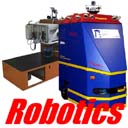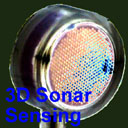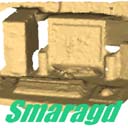
|
Robotics & Process Control Research Group
Prof. Dr. E. von Puttkamer
University of Kaiserslautern
Department of Computer Science
|
Diese Seite in Deutsch

Current research activities - Overview
The group's main research topic is the application of computers in the control of technical processes.
Special fields of interest in current research and development are autonomous mobile robots, sonar-based ground profile analysis and 3D-scanning.
Please visit the completed projects page for the description of finished projects in the fields of mobile robotics, simulation and 3D-body-scanning (TOPAS).
Mobile Robots - current research activities:
 General aim of the current research activities is the prototypical realization of an autonomous mobile robot (service robot)
that is able to conduct task-specific actions under realtime conditions in a previously unknown environment. Potential applications are services like floor cleaning, transportation and surveillance.
General aim of the current research activities is the prototypical realization of an autonomous mobile robot (service robot)
that is able to conduct task-specific actions under realtime conditions in a previously unknown environment. Potential applications are services like floor cleaning, transportation and surveillance.
(Technical overview
experimental research platforms, picture gallery)
- CAROL:
CAROL (Camera Based Adaptive Robot Navigation and Learning) is a new project targeting at the development of adaptive methods for camera- and multisensor-based mobile robot navigation. Platform for these research activities is the autonomous vehicle Phoenix.
- MOBOCOB:
Within the MOBOCOB-project (mobile robot control by concurrent behaviors) a generic framework for investigating behavior-based architectures is being developed with special respect to learning techniques. The main focus lies on Learning from Demonstration (LFD) of reactive behaviors as well as temporal sequences in the spatial domain. MOBOCOB is implemented on the experimental mobile robot Phoenix.
Sonar-Based Ground Profile Analysis:

Participating in the "Autonomous Walking" research programme, sponsored by the Deutsche Forschungsgemeinschaft (DFG, German Research Community), this project aims at sensing ground profiles for safe leg placement of walking machines by means of 3D sonar ranging. Primary goals are the development of an array of simultaneously operating and individually coded sonar sensors and suitable signal processing algorithms. (Project description)
3D-Scanning:

The Smaragd project (Smart Aquisition of Geometric Range Data) aims at the development of new scanning techniques for easy and flexible 3D data aquisition of arbitrary objects. Target objects may differ in size by orders of magnitude, since one of the system's key features is the ability to autocalibrate on the object's dimensions. Scanning resolution is seamlessly adaptable to the object's surface structure. (Project description)
Last modified: 09.06.00
 Back to homepage
Back to homepage


![]() General aim of the current research activities is the prototypical realization of an autonomous mobile robot (service robot)
that is able to conduct task-specific actions under realtime conditions in a previously unknown environment. Potential applications are services like floor cleaning, transportation and surveillance.
General aim of the current research activities is the prototypical realization of an autonomous mobile robot (service robot)
that is able to conduct task-specific actions under realtime conditions in a previously unknown environment. Potential applications are services like floor cleaning, transportation and surveillance.
![]()